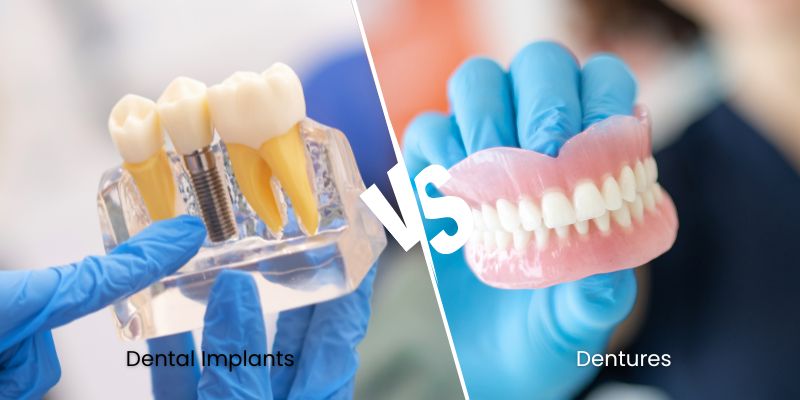Dental Implants vs Dentures How to Know Which is Right for You

Missing teeth can severely affect your quality of life, causing problems with eating, speaking, and even self-confidence. Modern dentistry offers effective solutions such as dental implants and dentures to restore your smile and oral function. But how do you choose between them? This blog aims to comprehensively compare these two options, allowing you to make an informed decision.
1. Dental Implants: Pros and Cons
Pros:
Natural look and feel: Implants resemble natural teeth, offering a natural appearance.
Longevity: With proper care, they can last a lifetime, making them a cost-effective long-term solution.
Improved function: Implants provide stability and chewing power comparable to natural teeth, allowing you to enjoy your favorite foods without limitations.
Preservation of jawbone: Implants stimulate bone growth, preventing bone loss associated with tooth loss.
No impact on adjacent teeth: Unlike bridges, implants don't require modifying healthy teeth for support.
Cons:
Surgical procedure: Implants involve a surgical procedure, which may require healing time.
Higher initial cost: Implants are generally more expensive upfront compared to dentures.
Not suitable for everyone: Adequate bone density and good overall health are necessary for implant placement.
2. Dentures: Pros and Cons
Pros:
Non-invasive: Dentures are a non-surgical option for replacing missing teeth.
More affordable: Dentures generally have a lower upfront cost compared to implants.
Suitable for various cases: They can be viable for those with insufficient bone density or certain medical conditions that may contraindicate implant surgery.
Cons:
Less natural feel: Dentures may feel bulky or loose, impacting comfort and confidence.
Reduced chewing efficiency: Dentures may limit your ability to eat certain foods.
Potential for slippage: Dentures can shift or slip while speaking or eating, leading to embarrassment.
Bone loss: Dentures don't stimulate bone growth and can contribute to further bone loss over time.
Need for adjustments and replacements: Dentures may require periodic relining or replacement due to changes in your jawbone.
3. Factors to Consider Before Making a Decision
Age and Health: While dental implants are generally suitable for most healthy adults, older individuals with extensive bone loss or certain medical conditions may be better suited for dentures.
Bone Health: Adequate bone density is necessary for implant placement. If you have significant bone loss, bone grafting or dentures may be more appropriate.
Number of Missing Teeth: Implants can replace single or multiple missing teeth. Dentures are often chosen for full arch replacements.
Lifestyle and Preferences: Consider your lifestyle and preferences. If you're seeking a permanent, natural-feeling solution and are willing to undergo a surgical procedure, implants may be ideal. If you prefer a non-invasive option or have budget constraints, dentures might be a better choice.
Cost: Dental implants typically have a higher upfront cost than dentures. However, their longevity and potential to prevent further bone loss can make them a more cost-effective option in the long run.
Prompt Care is Essential
Choosing between dental implants and dentures is a significant decision that requires careful consideration of your needs, oral health, and lifestyle. Your dentist is the best person to guide you through this process. They will evaluate your oral health, discuss your preferences, and explain the benefits and drawbacks of each option in detail. With their expertise, you can make an informed decision and achieve a beautiful, functional smile that enhances your confidence and quality of life.
Conclusion
Looking for dental implant treatment in Nagpur? Then visit WellDent Dental Care for expert advice and quality care.




